
"The Supreme Court is expected to get a chance to take a second look at a landmark 2007 decision that paved the way for federal regulation of greenhouse gas emissions from motor vehicles, power plants, and other sources. But this time, legal scholars say, a shift in the makeup of the court may lead to a much different outcome, one that could have far-reaching implications for the nation's battle against climate change."
"The issue emerged in late July when current EPA administrator Lee Zeldin unveiled a proposed rule that would rescind what is called the endangerment finding, a step that would essentially revoke the agency's authority to regulate activities that contribute to climate change under the Clean Air Act. The finding has its roots in a 2007 case filed by Massachusetts along with some other states, cities, and environmental organizations, to force the administration of George W. Bush to regulate greenhouse gas emissions from automobiles."
"Legal scholars say justices could reverse decision allowing EPA to regulate greenhouse gas emissions on technical grounds amid shift in court makeup. And the decision could have much more to do with technical legal arguments than the validity of the prevailing science. "There were five justices to four justices" in Massachusetts v. Environmental Protection Agency, said Richard Lazarus, the Charles Stebbins Fairchild Professor of Law at Harvard Law School. "How many of those five justices are still on the Supreme Court? Zero. The majority is gone. And of the four, three are still there.""
Supreme Court justices may reconsider the 2007 Massachusetts v. EPA decision that enabled federal regulation of greenhouse gas emissions under the Clean Air Act. A recent proposed EPA rule by Administrator Lee Zeldin would rescind the endangerment finding that authorized such regulation, effectively revoking EPA authority over activities contributing to climate change. The 2007 case prompted a 2009 endangerment finding that served as the legal basis for subsequent regulatory actions. Changes in the court's membership mean the original majority that upheld EPA authority no longer sits, increasing the likelihood of a different outcome on technical legal grounds.
Read at Harvard Gazette
Unable to calculate read time
Collection
[
|
...
]